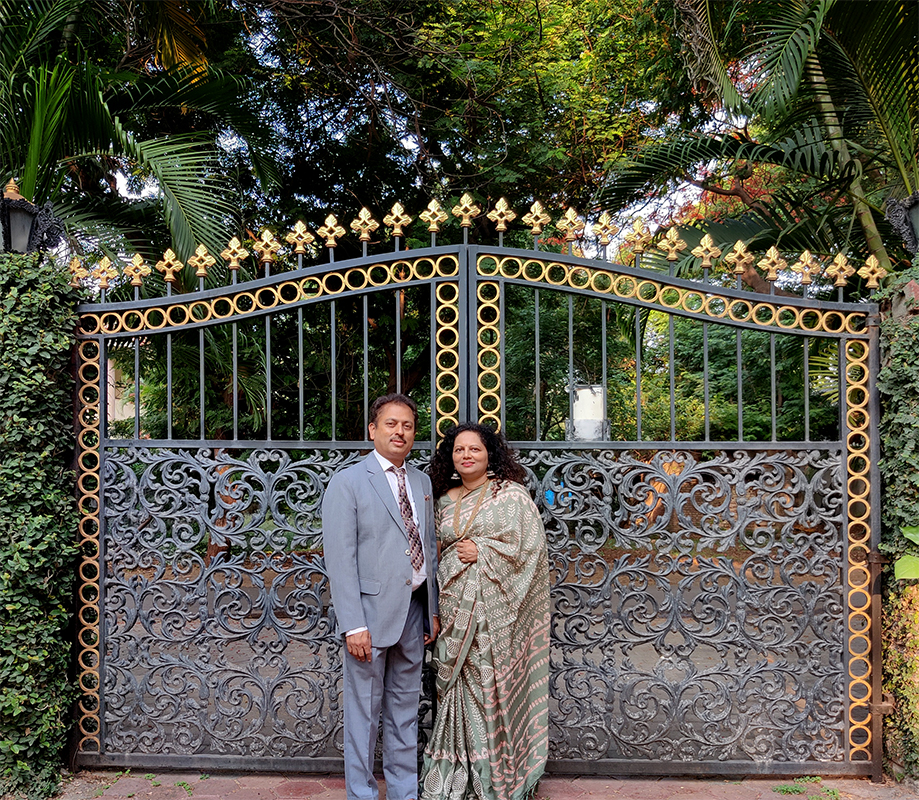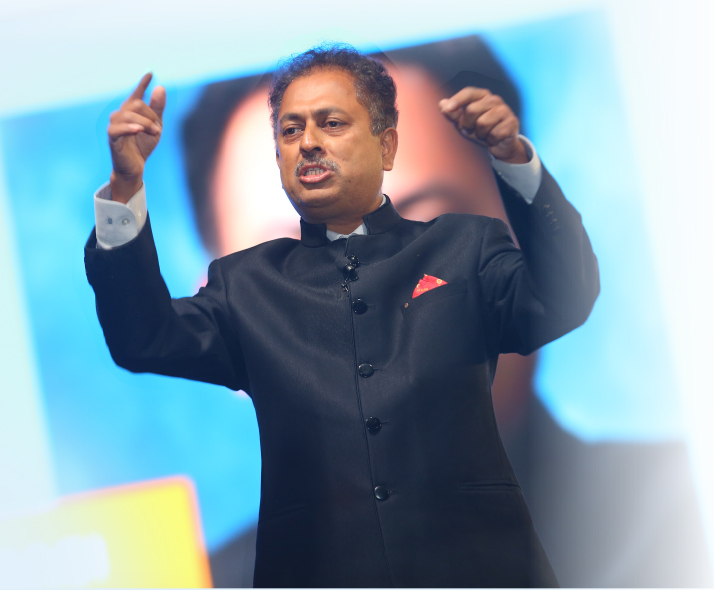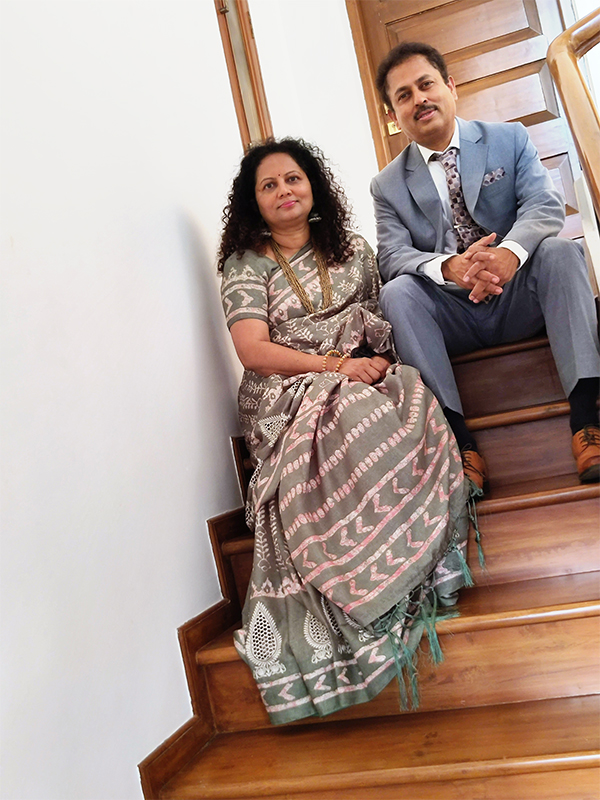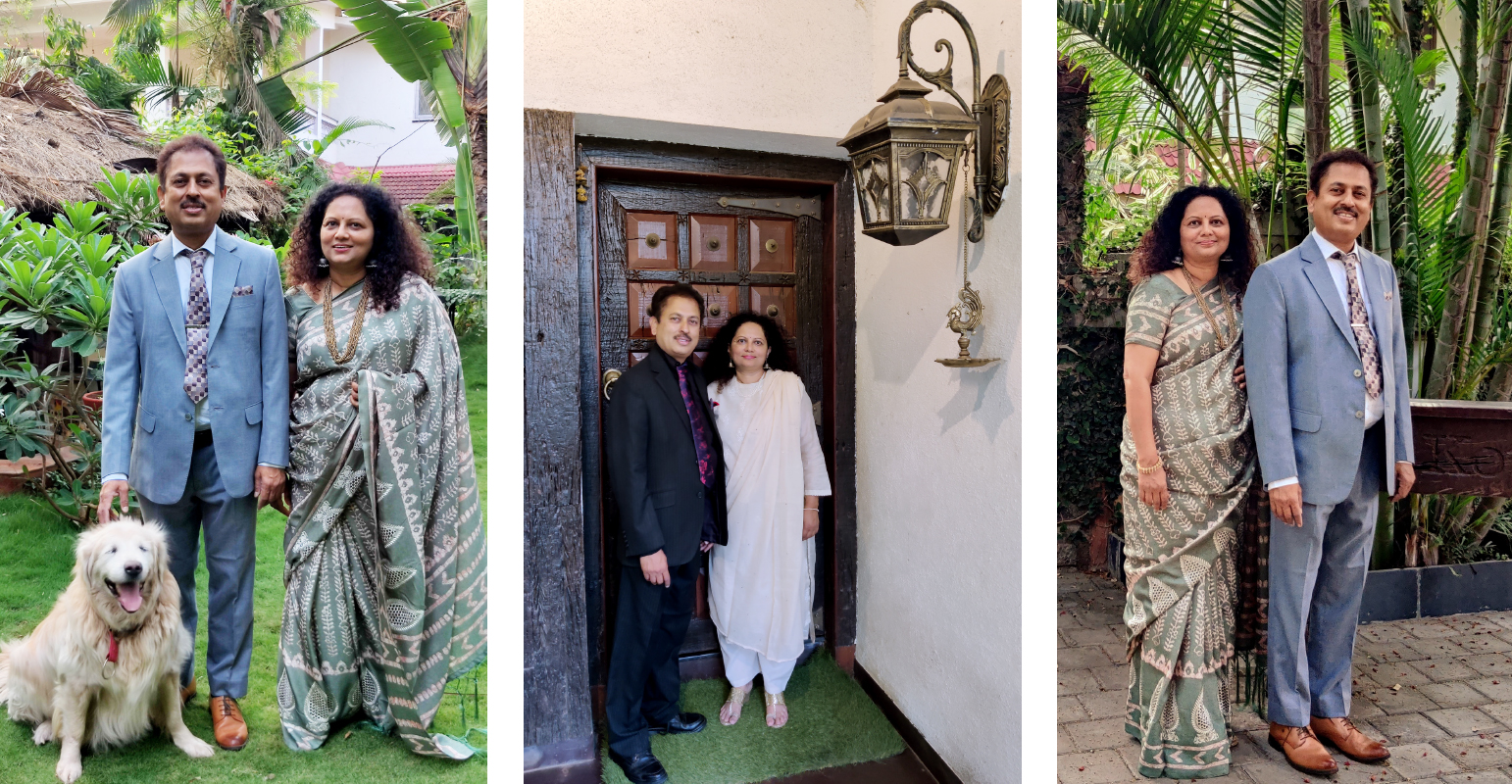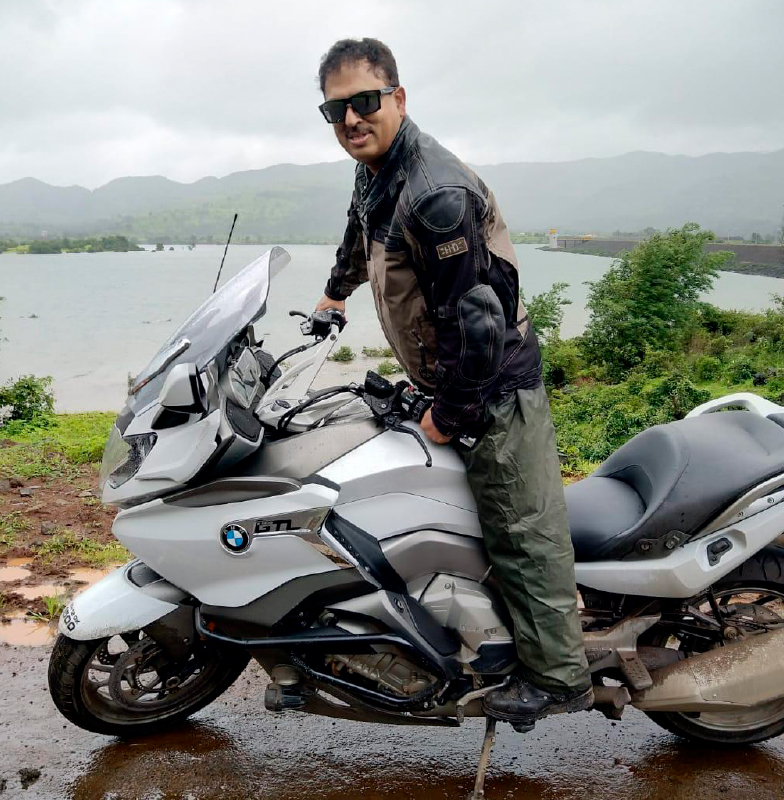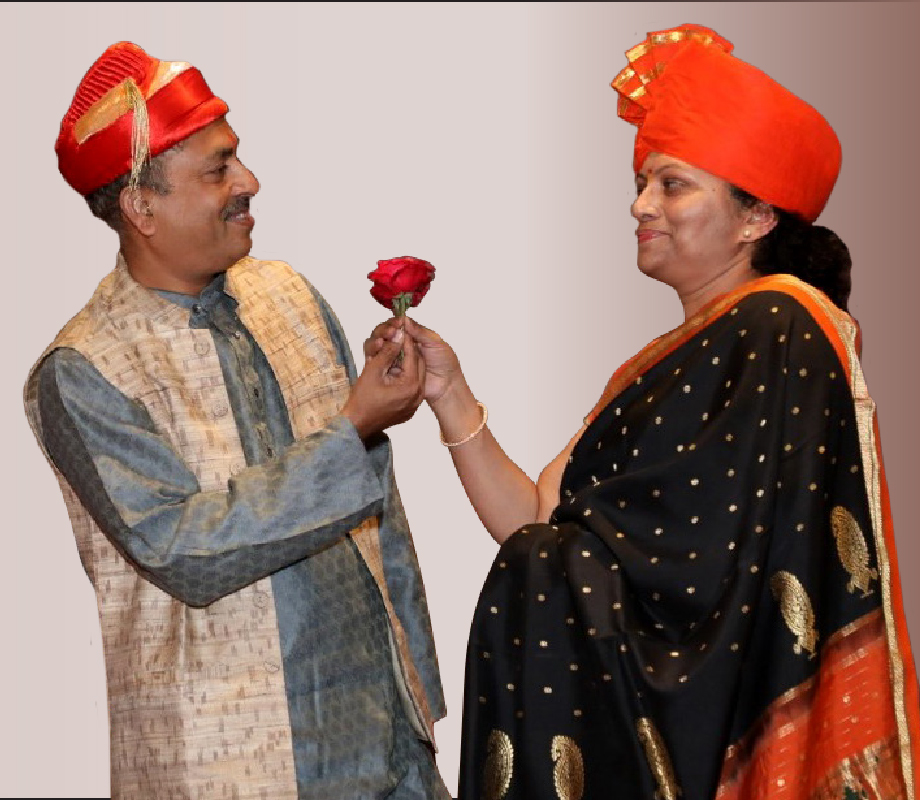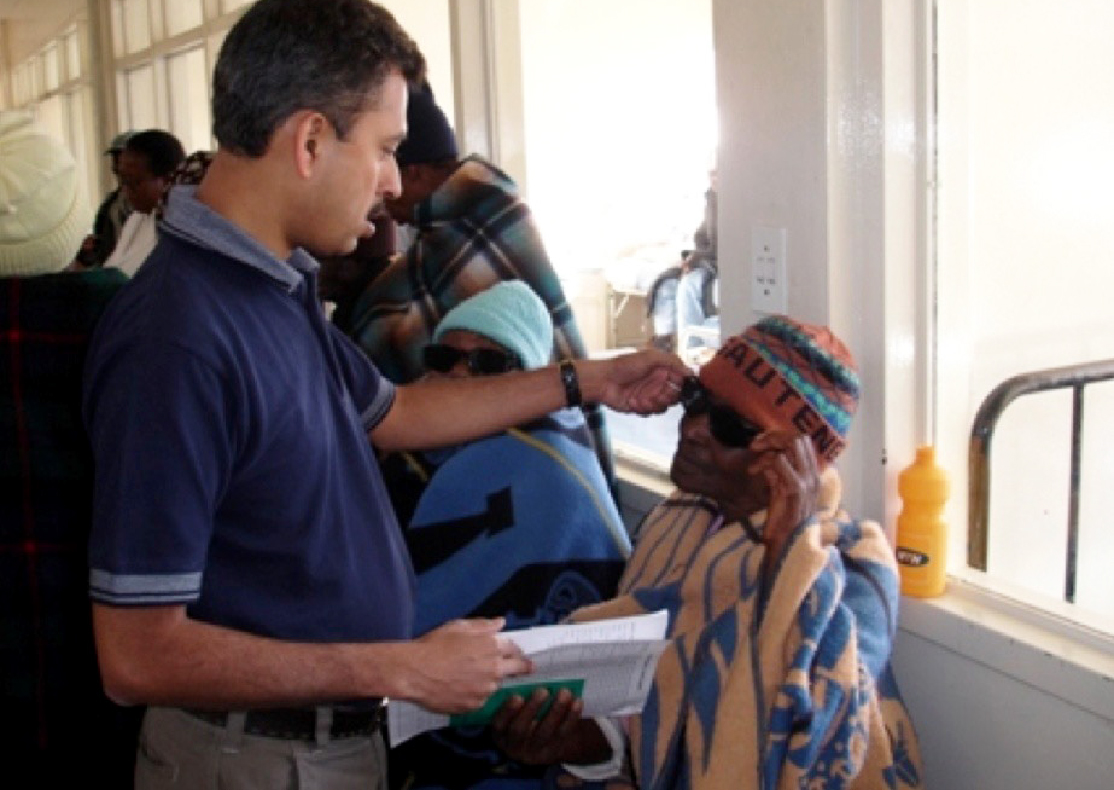Innovator, reformer, rebel: RIDE Mahesh Kotbagi
His demeanour gives you no clue of the tremendous pressure he is facing. His 75-bed Kotbagi Hospital is looking after 100 Covid patients when I interview him in late April. “The Covid situation in Pune is terrible, and in the 45 days we’ve been going crazy. We have about 100 covid patients, and see 5–6 deaths every day. About 30 per cent of our staff has tested positive, not once but twice. We vaccinate 400 people daily,” says incoming RI director Mahesh Kotbagi. He has also been managing and closely monitoring, long distance, Rotary leaders in India who have tested positive.
He is surrounded by doctors — both his father and grandfather are doctors, spouse Amita is one and so is his older daughter Chinmayi. Their younger daughter Sana will also qualify in medicine.
Kotbagi completed his PG in Obstetrics and Gynaecology from the Pune University in 1991. The same year he started the Kotbagi Hospital, choosing a different path from his father who served the government. “I started small; in my last year in college, I decided to build a hospital and took a loan.” When he graduated, only a part of it was ready and the hospital started with just 10 beds, and expanded later.
A votary of low-cost healthcare, he has served as a consultant for developing many low-cost healthcare hospitals. He set up the Chinmayi Medical Foundation Charitable Trust to support low-cost healthcare services and children’s education.
Early Rotary journey
His Rotary journey began when a visually-challenged Rotarian, Niranjan Pandya, later given a Padmashree for his service to the blind, approached Kotbagi’s father to join a new Rotary club — RC Pune Sports City — that he was starting. “He did not have physical vision but a huge mental vision. My father suggested that he take me instead.”
The reason was the son’s track record in the Pune University over 10 years. “I was the only student’s union representative to continue in office for 10 years, including being chairman for two years,” Kotbagi smiles. He also became the youngest member of the Senate as a student representative, and was at the forefront of student agitations “to get justice for rural students and women. Pune was an education hub even then and had students coming from over 25 states, there were a lot of problems they faced, migration, admission, delayed exams, and we launched an agitation for something called ATKT (allowed to keep term) demanding that a student failing in one subject should not lose a year.”
So, did he also need this ‘ATKT’, I ask him jokingly.
“Luckily not,” he laughs, adding, “I was a brilliant student. I didn’t need it but fought for others.” A very popular student leader, he could easily organise student rallies 25,000–50,000 strong. “People thought I would join politics!”
Did he have the opportunity, I ask him. “Oh yes, I was offered all the seats… municipal corporation, MLA’s seat, a Mayor’s post and even a Rajya Sabha seat. But I turned them all down because my parents dissuaded me, even though in those days educated people used to join politics. Asking me to join Rtn Pandya was perhaps my father’s indirect way to stop me from getting into a political career!”
The young Kotbagi asked Pandya what was expected from him. “His dream was to build one of the largest eye hospitals in Maharashtra and he banked on my experience in the hospital industry. He wanted a trustworthy person who could sign cheques and do other work.”
Taking up the challenge, Kotbagi joined the club in 1995 and researched blindness. “I was connected to the Christopher Blind Mission, Germany, Sightsavers India, The National Blind Mission; visited the Aravind Eye Hospital, Madurai, and attended the World Blind Forum in Australia. I learnt all about the blind and their psychology… how they think and plan; how a dog can be trained to accompany a blind man on travel, etc.”
He became club president within three years, participating in service activities and “getting great experiences, one of them being people promising to donate, but not doing so. After six months, I couldn’t even raise enough money to pay the printer for the donation receipts printed,” he recalls.
But it taught him what fundraising involves. “Later, with people’s contributions we could achieve so much but the beginning was sketchy.” Pandya was the executive secretary of the Pune Blind Men’s Association (PBMA), one of the largest organisations for the blind in Pune, and the hospital was meant for the PBMA, Rotarians and CSR partners. “The hospital took 10 years to build, the government gave subsidised land, and today it is the largest hospital for the blind in Maharashtra and does 100 free eye operations daily,” he says with pride.
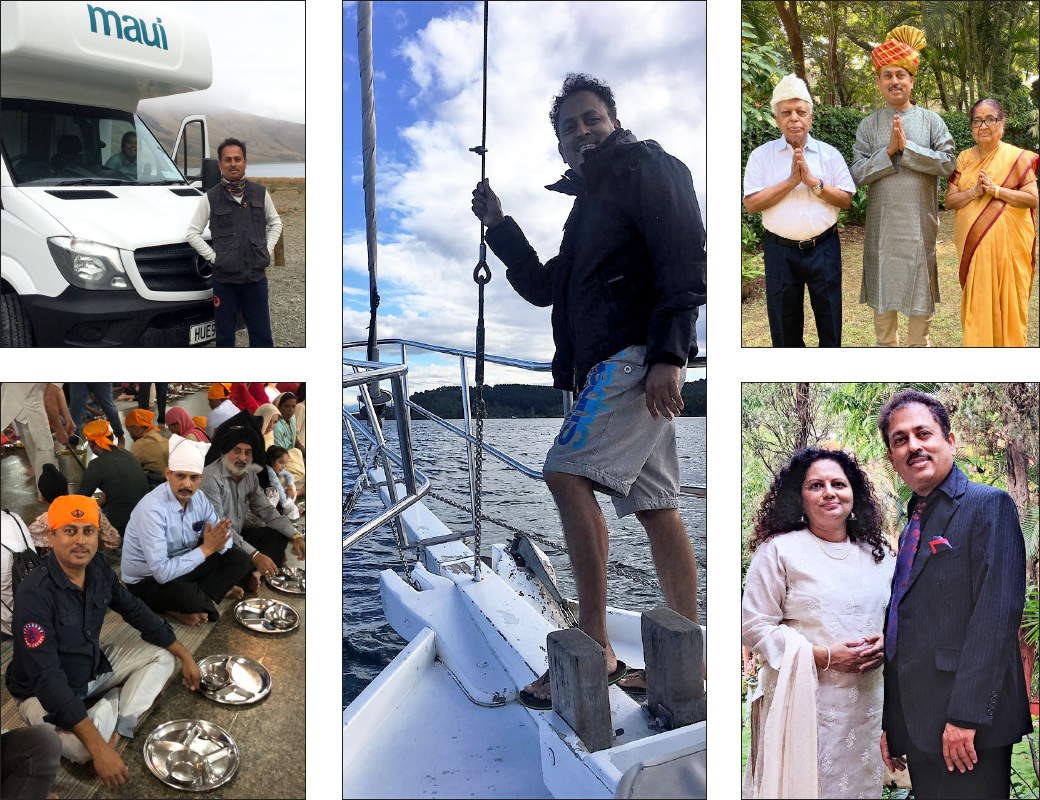
Kotbagi was the youngest member of his club and district (then 3130) which had 155 clubs. In 1997, when the president-elect was suddenly transferred to Europe, “the board said the only person who can take over at the last minute is Mahesh.”
How he became governor is an interesting story; after his presidential year, he applied to be the leader of a GSE vocational team, and got selected too. “But in the group discussion with the DG and PDGs, they said you are the best candidate, but being much younger than the team members, you can’t be selected. But you still have age on your side, and can do this later.”
Feeling “discriminated against”, he resigned as a member of the district secretariat; “the DGE asked me are you angry. I said no, I resigned because a district bylaw says this membership disqualifies me from contesting for the DG’s post. And I am going to do that. So that in the future I will not be interviewed, but do interviews as a DG.”
Rotarians have to realise that you’ll become a past governor or director. But nobody can make you a past-Rotarian. Once we realise this, other problems will disappear.
Amidst shock and disbelief from the “elders”, Kotbagi contested, and won, with “a thumping majority”.
Coming to the highlights of his governor year, Kotbagi says along with Japanese Rotarians, they put up women’s literacy centres. “Amita and I did a friendship exchange visit to Japan, they visited Pune, we adopted 13 villages and built many vocation centres, schools, trained batches of women and donated buses to them.”
But the project dearest to his heart and a trailblazer was putting up recreational facilities at the Bal Kalyan Sanstha in Pune, a small school for spastic children. “We worked with them to set up the first audio-visual room, a big screen to put up cartoon and other films, taught them singing and swimming, organised horse and camel riding and other cardio-related activities. We got some buses from corporates, modified them to give easy access, and bring some 2,000 special children, including from rural areas, to this centre every week for recreation.”
Our members regularly visit the recreation centre for spastic children, and thanks to their involvement in this centre, our club’s membership has remained at cent per cent.
At his initiative his club gave up holding meets in star hotels and met here; “this gave us more money for this centre and made the members really involved and attached in its service activities. For 25 years now, our club meetings are held here, our members meet the spastic children and with or without Rotary visit, the centre and the children treat us like their guardians. Thanks to involvement in this centre, our membership has remained at cent per cent.”
On the journey to an RI director’s post, he feels those who helped his growth were PRID Sushil Gupta, “who despite having such a huge business empire, when it came to Rotary, he was connected to ground reality. We started working together on projects. Then there was my association with Shekhar Mehta, who wasn’t even an RID then, Kamal Sanghvi, Manoj Desai, Gulam Vahanvaty and Ravi Vadlamani. Shekhar’s energy, even today, is phenomenal. The six of us were founders of the Rotary India Humanity Foundation which led to the RILM.”
At district conferences, all the delegates around me either had grey hair or no hair. There was no concept of a young Rotarian in our district in those days.
As Mehta, Desai and Sanghvi became directors, “I felt when you get involved in work and deliver, your worth is recognised.”
About women’s membership, he says that his own district 3131 has over 30 per cent women, which is above the international average. “In cities educated and professional women are available but rural areas are a challenge. Women prefer to go in groups, so let’s develop a module to recruit them in small groups and follow the same one for involving them in projects. If you put two women in a club of 35, they won’t stay for long. Women above 40 also is a good target group.”
As RI director, Kotbagi will also be part of the RI Board’s Executive Committee (EC) comprising the EC chair, RI president, RIPE, RI vice-president, treasurer and an RI Board member.
Pictures of RIDE Mahesh Kotbagi and Amita by Sana Kotbagi.
At a glance
Religion: I believe that god is everywhere; I go to every religious place, mosque, church temple, etc.
Food: I am a foodie, and my favourite cuisine is Indian non-vegetarian.
Favourite holiday destination: I am a globetrotter; have done biking, car rallying and flying in over 50 countries. Difficult to list one place but the Indian Himalayas, Norway, Ireland and New Zealand are my favourites. Though Amita likes Alaska. In New Zealand, with my family, I drove in a recreation van from north to the south. In every country I drive; no packages or hotel reservations!
Reading: A very poor reader. My mother would give me 25 paise per page to listen. That’s how I became a doctor!
Music: I love world music… all kinds of jugalbandhi, piano, rap, saxophone, tabla, etc.
Movies: I don’t go to a theatre for 5–10 years at a stretch!
Favourite actor: Amitabh Bachchan, forever.
Relaxation: I don’t ever relax.
Fitness: I do a lot of adventure activities. Dirt track, long rides of 1,200km in a single day on a Harley Davidson. I ride BMW and Mercedes Benz and have done car rallies from my college days.
Cooking: I love doing barbeques and grills, which are loved by my friends. I can do all kinds of meats, fish, lamb, chicken.
Fitness: I did gymming and cardiac activities regularly, but in the last 18 months Rotary hasn’t left me any time.
District conferences of yore
In many district conferences, including ours, in those days, all the past district governors would sit on the stage for all the days… the entire duration of the conference, not only the opening session,” recalls Mahesh Kotbagi. So and so that “as a young and naughty Rotarian” he used to ask those seated around him, “Don’t these PDGs need to use a washroom? How can they sit on the stage for so many hours on end? All the delegates around me either had grey hair or no hair. There was no concept of a young Rotarian in our district in those days. The average age of the governor was 65–70.”
During his DisCon as DG, Kotbagi condemned the system of all DGs sitting on the stage, saying “when the star speakers are addressing the delegates the VIP delegates are seated behind, watching his back. With no interchange of facial expressions or eye contact, the speech has less impact. I said only the speaker should be on the stage, and everybody else, including the DG, should be in the audience. The blank podium and stage that you see in district conferences today began with my year as governor.”
Kotbagi says he was involved in the planning of 10 Rotary Institutes; “these used to be equally dry, with half the time taken up in recognising past directors and senior leaders, and people used to get totally bored.”
The other bane was long introductions; 10 minutes intro for an 8-minute speech! “Most of the times it was ‘you scratch my back I will scratch yours’. I am very blunt and said all this nonsense has to stop. The first AV intro clip was introduced by me at Shekhar Mehta’s institute as director. I said no AV above two minutes!” The same was done at Literacy summits, where he was closely involved in the planning and execution.
Amita’s role
Both Amita and my parents have played such a huge supportive role. I am the youngest to become director in our zone. We needed to travel a lot and my parents always said you are doing social service, so travel wherever you want. And they said the same to Amita, who they consider their daughter. When I won the DG election, Amita was holding our younger daughter! When we went to the IA, Amita literally put together an army of relatives — my parents and sister, her parents and sisters — to take care of the children. (Amita adds: “The kids were very happy because they were being pampered, it was I who used to be crying when I called them on the phone. At some training sessions, Rotarians would have our children on their laps while both of us were on the stage!”)
Amita has been absolutely supportive in my hospital work, family work, Rotary work, and was involved in all Rotary activities. She joined Rotary in 2000, has been president, assistant governor, trainer and held all posts except that of governor!
Mahesh speak
Leadership qualities: Quick decision making, innovation and transparency.
Priorities in next two years: Training; I’m a hardcore trainer. I also want to arrange 15 medical missions to 15 Indian states, to provide free surgery and medical assistance to nearly one lakh people. We are talking to CMs and state health ministers. Two, RILM will always be given priority as literacy is our future and it’s a shame that from 1947 to 2021, we haven’t been able to make India literate.
Rotary India’s strengths and weaknesses: The service projects we do and the man hours put in; we are on one side and the rest of the world on the other! We have single districts doing 40 GGs, 20–25 CSR grants and other projects which are not even reported. The highest number of GGs are done in our zones, because we have the platform and opportunities to do service. Also, all our religions equate service to punya so it is in our DNA and culture.
Our challenge is that as we grow, there is more competition and politics. We can’t say we’ll grow but not have politics. How do we deal with it? We need a magician! Not having elections is not correct; it is the members’ democratic right. But Rotarians need to realise that a DG or director is only for a period; you’ll become a past governor or director. But nobody can make me a past-Rotarian. Once we realise this, other problems will disappear.
Pandemic challenges: Several formats will have to change; if you want youngsters, you can’t have 20-minute introductions or a club newsletter with 20 pictures of the president and his wife! If you want women, meeting venues can’t be too far and events late into the night, where some people might get drunk and pass unpalatable comments. Women will simply walk away. Meetings too will have to be flexible, and can be held over breakfast, lunch or online. We say Rotaractors are now part of Rotary. Good, but one Rotaractor asked me why a pin of a bald Paul Harris. We’d like a pin of a young Harris. Post-pandemic, a hybrid version of Rotary has to evolve with 40 per cent online meetings. In big cities, they’ll give relief from long drives with traffic jams!
Cherished values, learning: As a child I saw my father go on bullock carts to villages to deliver medical care or medicines. I watched farmers bringing rice bags, jaggery or vegetables to my mother saying he saved our lives, this is a small token of appreciation. I learnt as a child that money is not necessary for appreciation; or a degree to impart knowledge. And that muscle doesn’t necessarily give strength.
Dream: I never asked anything from Rotary but Rotary gave me great platforms, a friend in every corner of the world, so many opportunities to speak, interact, learn and act. I never asked for anything and came up to here, and will surely take me farther.
Amita speak
How did she meet Mahesh, I ask Amita. “Oh, Mahesh is my childhood friend and we met when he was in Class 12 and I in Class 11. We became close friends, and initially I had thought of joining engineering because my father was an engineer but Mahesh said he was going to be a doctor and said it will be better if you join me in my profession.”
Under his influence, the girl who had in Class 11, dropped biology and taken math, did a switch again the next year!
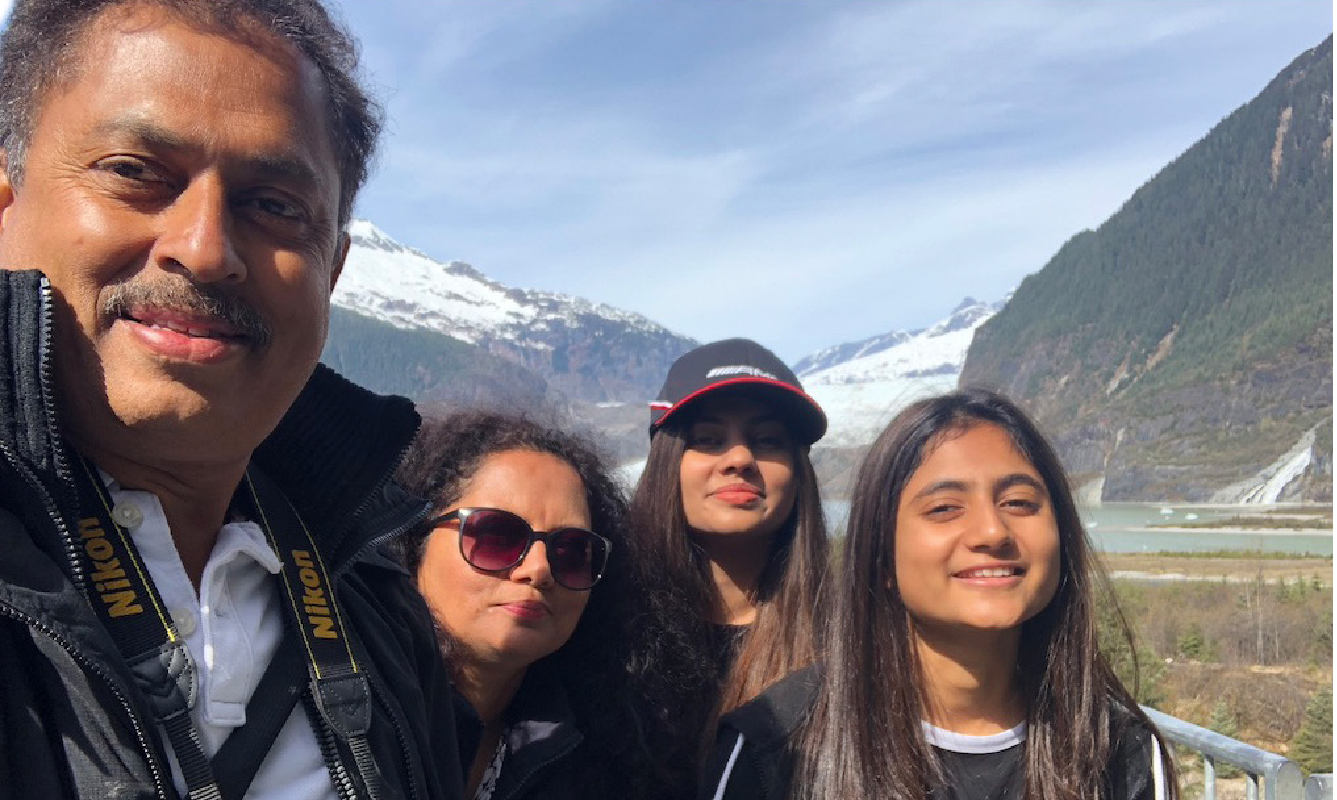
As to when friendship turned into love, she says, “As we were in the same profession, we kept meeting each other on different occasions and there came a time where there wasn’t even the need to say that we were in love. Of course, it was Mahesh who proposed and we were married in 1991, and had our first daughter in 1993.”
Kotbagi was only 24 and “his mother says he was a small boy when he got married!” She first practised as a GP, and as their hospital grew, did a course in hospital management and is now into administration.
On how she responded to Rotary taking away so much of her husband’s time, Amita says: “I was busy with my own career and the kids were also growing up. His parents are great philanthropists, so service is part of our family.”
She was so closely involved with his Rotary activities, that she too joined the same club in 2000 and in April 2009, when the incoming president resigned at the last minute, “club members requested me to take over as president.”
On her year as president, she says she got full cooperation from everybody. “They were so happy that I heeded their request that they happily assisted me in whatever I asked and I thoroughly enjoyed my year. Also, I had the great help of Mahesh, an encyclopaedia on Rotary, so I didn’t have to worry!”
Finally, on Kotbagi’s finest qualities she says: “He is so passionate about what he does, is a great orator and I am so proud of the power he has to motivate and convince people to implement his smallest ideas. Above all, he is a people’s man; he can spontaneously sit on the floor and share a meal with people, this makes them very happy and they feel he is part of us… and their friend for long years. That is an outstanding quality that he has!”
Challenges of running a hospital during pandemic
While chatting with Rotary News, RIDE Mahesh Kotbagi gave an interesting insight into the unique challenges involved in running a hospital for Covid patients. “We are looking after 100 Covid positive patients and are stretched to our limits, especially in terms of administration and facilities. There is no oxygen supply, there is no Remdesivir supply, and many of our staff members, despite offering any amount of money, are not willing to come to work because they are worried about their own families, which is understandable,” he says.
He explains that in normal times a unique aspect of the Indian hospital industry is that the “relatives do a lot of work in terms of getting food, doing the laundry, and provide a lot of mental support to their hospitalised relatives. But in the Covid scenario, where the relatives cannot come to either visit or stay with the patients, right from giving the patients a cup of tea at 6am to managing their hygienic and nutritious food and laundry is all our responsibility. Managing a Covid unit and a normal medical facility are very different experiences, and pose so many challenges.”
Another major dilemma arises when “sometimes the husband, wife and children are positive. There is nobody to even buy the medicines or withdraw money from the ATM. So there are a lot of socio-psychological issues involved in managing Covid patients. The death of a Covid patient is also an emotional factor as you cannot hand over the body to the relatives and hence we had to manage more than 100 funerals,” he adds.
Kotbagi’s hospital is one of the largest in his region; about 400 vaccine shots are given daily here.

